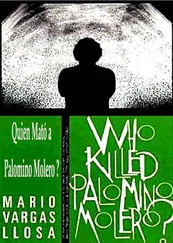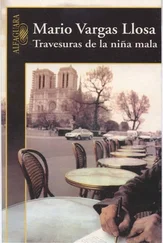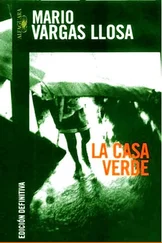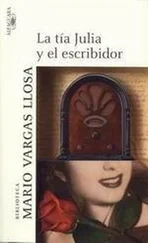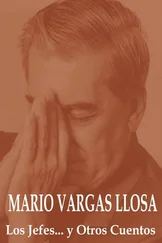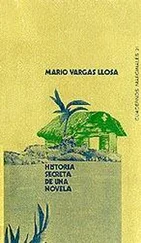“We danced together, too. Just once. He danced with all the girls once. But twice with Lala Mercado-because it was her party, not because he liked her more. Nobody thought it was wrong for him to dance with us. In fact, we all wanted to dance with him. He behaved just like one of us. And he was a terrific dancer.”
Just like one of us, thought Lituma, carefully stepping over a dried-out starfish covered with ants. “Would Alicia Mindreau think of Lieutenant Silva as ‘one of us’? Not me, of course. I’m a purebred cholo,” be thought. “From La Mangachería, and proud of it.” He had his eyes half closed and he wasn’t seeing how Talara’s afternoon was quickly giving way to night. He was seeing the party and the garden, all the well-dressed young couples over in that whites-only part of town near the sand flats by La Chunga ’s place on Buenos Aires Street. Lala Mercado’s house. He was seeing a couple dancing in a corner, staring into each other’s eyes, speaking only with their eyes: Alicia Mindreau and Palomino. No, it was impossible. And yet she was the one telling the story:
“When we started dancing, he told me that the moment he saw me he’d fallen in love with me.” Not even now was there a note of sadness in her voice. She was speaking quickly, without emotion, as if dictating a message. “He told me he’d always believed in love at first sight and that now he knew it was real. Because he’d fallen in love with me right then and there. He said I could laugh at him if I wanted, but that it was the truth. He’d never love another woman in his life. He said that even if I told him to get lost, even if I spit on him and treated him like a dog, that he’d go on loving me until the day he died.”
“He kept his word, too,” thought Lituma. Was she crying? Not a chance. Lituma couldn’t see her face-he was still one step behind the lieutenant and the girl-but her voice was dry, unwavering, severe in the extreme. At the same time, it was as if she were talking about someone else and not herself, as if what she was saying had nothing to do with her, as if there were no blood and murder in her tale.
“He said he’d come over and serenade me. That if he sang to me every night, he’d make me fall in love with him,” she went on after a short pause. The rhythmic screech of the bicycle made Lituma feel an inexplicable anguish; he waited for it to come, and when it did, a chill ran through his entire body. He listened to the lieutenant chirping away like a little bird perched on Alicia Mindreau’s shoulder:
“Did it really happen like that? Was that the way it was? Did he keep his word? Did he really come over to the Piura Air Force Base and serenade you at your house? And did you end up falling in love with him?”
“I don’t know.”
“She doesn’t know? How can she not know that?” Lituma searched his own memory for the time when he’d been most deeply in love. Was it with Meche, Josefino’s girl, a statuesque blonde for whom he’d never dared to make a play? Sure, he’d been in love that time. How can you not know if you’re in love? How dumb can you get? Which means she’s nuts. Or was she just playing dumb to screw them up? Could the colonel have taught her how to act like that? He couldn’t decide.
“But Palomino Molero did serenade you over at the Air Force base in Piura, didn’t he? Did he do it often?”
“Every day. Starting the night after Lala Mercado’s party. He never missed once, until Daddy was transferred over here.”
“And what did your dad say about those serenades?” chirped the lieutenant. “Did he ever catch him at it?”
“My father knew he was serenading me, what do you think he is, deaf?” It seemed to Lituma that Alicia Mindreau was vacillating, as if she had been about to say something and then was sorry she’d thought of it. “What did he say about it?”
“That for Palomino I had to be something special, the Queen of England,” stated the girl in her dead-serious voice. “When I told Palito about it, he told me Daddy was wrong, that I was much more than the Queen of England for him, that I was more like the Virgin Mary.”
For the third time, Lituma was sure he’d heard Lieutenant Silva’s mocking little laugh. “Palito? Was that her pet name for him? Which meant that Palito was an okay name, but Palomino or Temistocles were cholo names. Damn but these whites are complicated people.”
They’d reached the Guardia Civil station. The man on duty, Ramiro Matelo, from Chiclayo, had abandoned his post, shutting the office door behind him. Lieutenant Silva used the bicycle as a doorstop to keep it open.
“Come on in and rest awhile,” invited the lieutenant making a half bow. “We can offer you a soda or a cup of coffee. Please come in.”
Night had fallen. As Lituma and Lieutenant Silva lit the paraffin lamps, they bumped into each other and into the office furniture. The girl waited calmly by the door. No, her eyes had no tears in them. Lituma saw her slim shadow appear against the bulletin board where they pinned up reports and the orders of the day, and thought about Palomino Molero. He was afraid, panicky. “I can’t believe this is happening to me.” Did that immobile little thing over there really tell them all that stuff about Palomino Molero? He was seeing her, but at the same time it was as if the girl were not there and had said nothing, as if it was all a figment of his imagination.
“I hope our little hike didn’t tire you out.” The lieutenant was lighting the camp stove, on which there was always a full kettle of water. “Get the young lady a chair, Lituma.”
Alicia Mindreau sat on the edge of the chair, with her back to the door and the lamp closest to it. Her face was half in shadow and her silhouette was surrounded by a yellow haze. She looked even more like a child. Could she still be in high school? In one of the neighboring houses they were frying something. In the distance, a drunken voice was singing about the city of Paita.
“What are you waiting for, Lituma? Get the young lady a soda.”
Lituma rushed to get a Pasteurina out of the pail of water that kept their soda supply cool. He opened it and offered it to her, excusing himself: “I’m sorry but we don’t have any straws or glasses. I’m afraid you’ll have to drink straight from the bottle.”
She took the Pasteurina and raised it to her mouth as if she were a robot. Was she nuts? Or was she suffering inside and couldn’t show it? Did she seem so strange because she was trying to cover up? Lituma thought she looked hypnotized. It was as if she didn’t realize she was there with them, as if she had no idea what she’d told them. Lituma was embarrassed, uncomfortable seeing her so serious, so fixed and unmoving. He was frightened. Suppose the colonel turned up right now with a patrol to get even for this little chat with his daughter?
“Here, have a cup of coffee, too,” said the lieutenant. He handed her the tin cup of instant coffee. “Sugar? One or two?”
“What’s going to happen to my father?” she asked suddenly. There was no fear in her voice, just a trace of anger. “Will they throw him in jail? Will they shoot him?”
She’d put down the cup, and the lieutenant picked it up and took a long drink. Then Lituma watched him sit on the edge of his desk. Outside, the drunk was still babbling about the same subject, the stingrays in Paita bay. He said he’d been stung in the foot and was looking for a compassionate woman who’d suck out the poison.
“Nothing’s going to happen to your father,” said Lieutenant Silva. “Why should anything happen to him? They won’t touch him. Don’t worry about it, Miss Alicia. Sure you won’t have some coffee? It looks lilce I’ve drunk this cup, but I can make another in a second.”
Читать дальше

